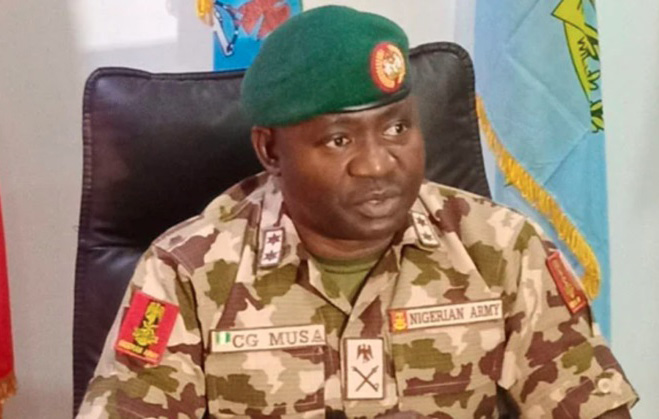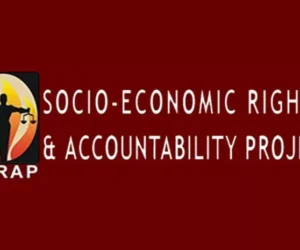0
ABUJA – At 5:12 a.m., there is power cut again in the two-room quarters that Sergeant Musa once paid for before he was ambushed outside Dikwa. His widow, Hauwa (not her real name), lights a stub of candle and counts coins on a cracked plastic tray: enough for garri and sugar, maybe beans for the children, if the woman across the corridor will sell on credit. On the wall, a portrait in fading green-brown camouflage watches over a home held together by threadbare resolve. The war took a husband. Bureaucracy and poverty have been trying to take the rest.
For more than a decade, Nigeria’s wars — in Borno, against Boko Haram and ISWAP; in Zamfara and Katsina, against bandits, and in the North Central, against armed militias—have redrawn family life around the barracks. Behind casualty figures are wives and children thrust into sudden widowhood or single parenthood. Their grief is not only private; it is structured by how the state mourns and how institutions pay—or delay—what is due to them.
In 2021, Bolajoko’ husband, Oladapo Joseph, a senior army officer, died on active duty. Nine years on, she is still fighting neglect and paperwork to access benefits many assume arrive automatically. Her testimony captures the slow-burn cruelty of loss after loss: first the man, then the income, then the dignity of not having to beg for what policy already promised. In Maiduguri that same year, other widows of slain soldiers faced eviction threats from barracks even before their entitlements could stabilize their lives. Their message was simple: grief was being timed by the stopwatch of bureaucracy, not compassion.
Four years later, the drumbeat has not dulled. At a widows’ forum in Kebbi State in May 2025, Asma’u Noma, a coordinator of the Military Widows’ Association, spoke with a hard steadiness about everyday desperation—women still waiting for life insurance and death benefits, mothers choosing between transport to Abuja to chase files and school fees that are due.
“A lot of them are wallowing in poverty and hunger,” she said, describing harassment and extortion some face while processing entitlements and the trauma of doing it alone with children looking on.
EXTORTION, PAIN
Rashida Hamajoda, herself a widow, recounted how an officer once demanded either money or sex to “assist” her file. She told journalists she refused—and waited longer. It is a story that exists in two registers at once: the intimate shock of being propositioned while in mourning, and the public knowledge that power too often taxes grief in Nigeria. The military has publicly denied institutional complicity in such abuses and urged anyone with evidence to report through formal channels. But the gap between policy and practice is precisely where many widows live.
Conflict tallies often speak of “fatalities” in the abstract. Yet each one recalibrates a household. Independent trackers of political violence have consistently shown that Borno, Zamfara, and Katsina rank among the states with the highest deaths from conflict in recent years. The numbers help explain a quieter curve in the background: the rise of widows of service members and the swelling ranks of single mothers in military communities.
Across barracks in Maiduguri, Kaduna, Abuja, and Makurdi, you can see the symptoms without needing a spreadsheet: a women’s market that changes hands every few months as school term fees approach; the WhatsApp lists for “urgent 5k”; the queue for the Zakkat committee or the parish welfare kitty; the NAOWA outreach days when a bus unloads bags of rice, vegetable oil, and an envelope that stretches a week but can never cover a term. The humanitarian outreaches matter—120 widows supported here, 80 there, sometimes hundreds at a time in Abuja or Lagos—but as several women say, “Relief is a day; responsibilities are every day.”
Widowhood is the headline but single motherhood in the armed forces also grows from other wounds: marriages straining under repeated deployments; injuries that disable not just a limb but a household economy; alcoholism introduced by untreated trauma; transfers that split families across two or three states until they come apart for good. The same labyrinth that makes compensation a test of endurance also makes routine support complicated. Documents go missing. Commands rotate. A signature is “not in” until a billet changes and you start again.
In this maze, time turns to currency. The bus to Abuja is money. The day off work to stand in a corridor is money. And every delay teaches a bitter arithmetic: the poorer you are, the more it costs to be paid what you are owed. Some women start petty trading in the barracks—beignets in the morning, small chops at night. Others clean homes or take in laundry. A few find work as auxiliaries at the military hospital. Too many slip off the books entirely, surviving on favours that come with expectations. The line between “help” and harassment can be soft as a whisper, hard as a slammed door.
THE DARK DETOUR
Call it what the women themselves call it: survival. Some widows, especially very young ones with infants, speak in lowered voices about nights spent away from the blocks where everybody knows everybody. They are not criminals; they are hungry. “I have two boys that eat like soldiers,” one 28-year-old mother said. “People think it is glamour. It is not. It is a shame and school fees.”
Editors worry about libel when we name this practice; we should worry more about the conditions that normalize it.
Sex-for-assistance has long shadowed humanitarian crises in the North-East. Aid workers and security personnel have been implicated in different eras and different places. The military rejects any suggestion that this is standard or sanctioned, and it is right to insist on evidence for individual wrongdoing. But patterns are not invented in newsrooms; they are whispered in queues, confided to church groups and women’s circles, and passed as warnings—“don’t go alone; go with a cousin; don’t drink what you didn’t open.”
What makes this spiral hard to escape is not immorality; it is math. Death gratuity delayed six months can collapse a household. One year can push a family out of a home. Two years—more common than we admit—and a mother will accept nearly any proposition that keeps a child in school and the landlord quiet. To end the practice, moral sermons won’t do. Systems must work on time. Files must move faster than hunger.
Ask the school proprietress near Giwa Barracks and she will tell you how arrears form their own register. “We carry the children,” she says, meaning they allow them to sit for exams before fees arrive, because they know how the pipeline from Defence Headquarters clogs. But there is another cost: concentration slips when a nine-year-old is measuring his mother’s worry. Some children of the fallen withdraw; others act out. A few are excused from school for weeks when a mission’s benefits finally land and the family returns to their hometown for burials and rituals that grief had postponed.
Psychologists in Maiduguri and Kaduna say the barracks have a distinct profile of trauma: children with nighttime terrors that start on Armed Forces Remembrance Day; teenagers who associate uniforms with exits that never end; mothers who cannot sleep without the television murmuring because silence reminds them of the knock on the door. Without structured counselling built into the compensation process, wounds fester into habits.
INSIDE THE SYSTEM
To be clear, policy frameworks do exist. There are statutory benefits: Group Life Insurance, death gratuity, benevolent funds, sometimes housing contributions. There are welfare desks and human rights desks. There are officers’ wives associations—NAOWA for the Army, NAFOWA for the Air Force, NOWA for the Navy—that organise outreaches, skill trainings, and occasional scholarships. On paper, a safety net stretches below the tightrope. In practice, holes are where feet most often land.
Part of the problem is documentation. After a husband’s death, a widow must gather a choreography of papers: condolence letters, affidavits, declarations, death certificates, notifications, passport photos—hers and his. In cities with functioning registries, that is a day’s work and transport. In rural postings, it is a pilgrimage through offices not built to serve the bereaved. Another part of the problem is opacity. Who signs what, where, and when? Which desk handles which benefit? The answers often vary by unit and by month.
When the system is clear, it feels like respect. When it is not, it feels like contempt— regardless of intentions. You don’t have to tell a widow “we don’t care” for her to hear it in the silence of unanswered letters. You don’t have to say “wait” for her to taste it in the dust of another trip to Abuja.
THE BORNO BURDEN
Nowhere do these pressures converge more than in Borno. The insurgency’s epicenter has produced not just casualties but a geography of widowhood. In satellite towns—from Konduga to Bama—churches and mosques run parallel support groups for women whose men did not come back from Sambisa or Lake Chad. The loss is rarely just one person. In a single street, the war can take two husbands, a brother, and a cousin across three households. Solidarity helps but has limits. Food banks empty. Pastors and imams get tired of repeated funerals.
The stigma of being a military widow in a conflict zone adds layers others don’t face. Some landlords suspect “trouble” follows the uniform, even when the uniform is folded in a trunk. Some local men are wary of marrying into a family that may be relocated at a command’s notice. Others— less honourably—see vulnerability as opportunity. Interfaith marriages occur, sometimes out of love, sometimes out of the brute practicality that a man with income and in-laws offers more stability than the church’s promise to pray.
THE BARRACKS WOMEN
If the state is inconsistent, the women are not. Associations of military widows have multiplied, some national, some state-level, some unit-specific. They raise dues, share information, and accompany one another for file submissions—one to hold the baby while another signs; two to discourage predatory requests. They run small cooperatives where ten women each contribute modest sums and take turns receiving a bulk payout that can clear a debt or start a microbusiness. They create informal childcare during clinics and court dates. And they tell stories, carefully, to reporters willing to listen and protect them— because visibility is leverage and silence is the predator’s favourite room.
NAOWA and sister organisations have in recent years expanded their public outreach—distributing food and cash, visiting military hospitals, and launching small training programmes in ICT and tailoring. These interventions, while episodic, matter. A bag of rice is nourishment, but it is also recognition. An envelope of cash is sustenance, but it is also a signal: you are seen. The danger is when charity becomes a substitute for rights— when a widow must wait for a commemorative day instead of being able to rely on a calendar of payments she can plan around.
Sociologists who study Nigeria’s security sector say widows’ experiences are a stress test for the military’s claim to honour. If the fabric is strong where it is thinnest, it is strong indeed. If it tears under routine strain, that tear tells us something about readiness and morale. Analysts point out that predictable, transparent, and timely compensation is not just ethics; it is strategy. Young soldiers read the barracks grapevine. They know whether families are protected when the worst happens. If not, the quiet calculus of risk shifts: why take a hill if your wife will spend two years chasing your signature?
Mental health professionals add another dimension: unprocessed grief seeded across a community can, over time, alter its culture. Barracks that once bustled with communal play and shared meals can become villages of shut doors and whispered distrust. Children who grow up in such atmospheres may leave as soon as they can—and take with them a lifetime’s ambivalence about the uniform that raised them.
Back in Maiduguri, the candle burns low on Hauwa’s tray. She folds the money into a headscarf knot and wakes her eldest, who dresses his younger brother before first light. Somewhere, a siren yelps and fades. She lifts the portrait from the nail and wipes dust from the frame. “We have not eaten your, honour,” she says softly to the man in uniform. “But honour cannot be cooked.”
The war made her a widow. Policy can decide whether widowhood becomes the rest of her life’s definition—or just a line in a longer story of survival that Nigeria finally chose to respect.







